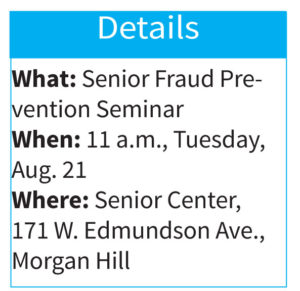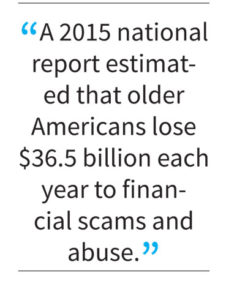Editorial – Learn how to prevent senior fraud abuse at seminar
Published in the August 8 – 21, 2018 issue of Gilroy Life
 Every year, more than a million older Americans fall prey to fraud by scammers. Many men and women in the South Valley have lost thousands of dollars — money they need for a good quality of life. Con artists who target senior citizens often reach out to them with phone calls, emails or regular mail promising cash, valuable prizes or good fortune if the recipient sends back a payment for processing fees. Particularly malicious is when they falsely claim a grandchild has been kidnapped and demand a ransom within a short amount of time.
Every year, more than a million older Americans fall prey to fraud by scammers. Many men and women in the South Valley have lost thousands of dollars — money they need for a good quality of life. Con artists who target senior citizens often reach out to them with phone calls, emails or regular mail promising cash, valuable prizes or good fortune if the recipient sends back a payment for processing fees. Particularly malicious is when they falsely claim a grandchild has been kidnapped and demand a ransom within a short amount of time.
If you are a senior citizen or have an elderly person in your family, we encourage you to join Santa Clara County Supervisor Mike Wasserman and Deputy District Attorneys at a free one-hour Senior Fraud Prevention Seminar 11 a.m. Tuesday, Aug. 21. It’s a good investment of your time to learn how to protect yourself or a loved one from becoming a victim. The seminar will be held at the Centennial Recreation Senior Center at 171 W. Edmundson Ave. in Morgan Hill.
According to the Justice Department, scams targeting senior citizens are increasing dramatically. The United States Census Bureau projected in 2000 that California’s elderly population will have doubled by 2025 to 6.4 million — a larger growth rate than any other state. A 2015 national report estimated that older Americans lose $36.5 billion each year to financial scams and abuse.
 One in nine people living in Santa Clara County is 65 or older. Many others are dependent adults. The Santa Clara County District Attorney’s Office is committed to prosecuting crimes committed against seniors and dependent adults. The District Attorney’s Office has a specialized unit that works with local police agencies to pursue these types of crimes. The office also participates in the Santa Clara County Financial Abuse Specialist Team. FAST is a multi-agency task force dedicated to addressing elder and dependent adult financial abuse. It meets monthly to review and take action on reported cases of such abuse. In addition to the District Attorney’s Office, FAST is comprised of representatives from Adult Protective Services, the County Counsel’s Office, the Sheriff’s Department, and the Public Guardian.
One in nine people living in Santa Clara County is 65 or older. Many others are dependent adults. The Santa Clara County District Attorney’s Office is committed to prosecuting crimes committed against seniors and dependent adults. The District Attorney’s Office has a specialized unit that works with local police agencies to pursue these types of crimes. The office also participates in the Santa Clara County Financial Abuse Specialist Team. FAST is a multi-agency task force dedicated to addressing elder and dependent adult financial abuse. It meets monthly to review and take action on reported cases of such abuse. In addition to the District Attorney’s Office, FAST is comprised of representatives from Adult Protective Services, the County Counsel’s Office, the Sheriff’s Department, and the Public Guardian.
The District Attorney’s Office also has a Consumer Mediation and Enforcement Division to assist elders and others with consumer-related issues. An elder is defined as anyone older than 65. A dependent adult is defined as anyone who has impaired physical or mental abilities or has inpatient status at a hospital or care facility. Anyone who commits larceny, theft by false pretense, embezzlement, forgery, fraud, or identity theft against an elder or dependent adult may be charged with an enhanced crime.
Financial fraud is the fastest growing form of elder abuse in America. Broadly defined, financial elder abuse is when someone illegally or improperly uses a vulnerable senior’s money or other property. Most states have laws that make elder financial abuse a crime and provide ways to help the senior and punish the scammer.
Elder financial abuse is tough to combat, in part because it often goes unreported. Many elderly victims are often too confused, fearful or embarrassed by the crime to report it. One recent study reported by Consumers Digest estimated that there are at least five million cases of this abuse in the United States each year, but law enforcement or government officials learn about only one in 25 cases.
We encourage senior citizens to attend the seminar and protect their life savings.
